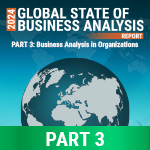
Career-Advancing Trends in Business Analysis
IIBA’s Global State of Business Analysis Report is your essential resource for career trends and statistics in business analysis. As an exclusive member benefit, this annual report offers invaluable insights into compensation, skills, developments, and demographics that define the business analysis community.
The world is rapidly changing—and business analysis can lead the way.
In the dynamic business landscape, staying informed is critical to career growth. To successfully build a resilient and adaptable future, business analysis professionals must draw upon a supportive professional community along with the right data, research, and tools.
IIBA's Global State of Business Analysis Report provides a broad view of topical information, insights, demographics, and trends that influence business analysis globally.
Read on for valuable insights to empower your professional journey.
Part 1: The Global State of Business Analysis
This report is the first instalment of a three-part series that explores key areas of the business analysis profession. Part 1 provides a panoramic view of topical information and insights on salaries, high-paying industries, education, and more.
Key Findings
Based on a survey involving more than 4,400 professionals across 165 countries, the Global State of Business Analysis Report offers a snapshot of the evolving business analysis landscape.
The report's key findings share trends shaping the field of business analysis, providing insights for professionals and organizations navigating the global business environment.
Become a member to access the report
The Diverse Business Analysis Landscape
Understanding the current state of the industry is key to navigating challenges. Explore the diversity of the report's respondents from around the world.
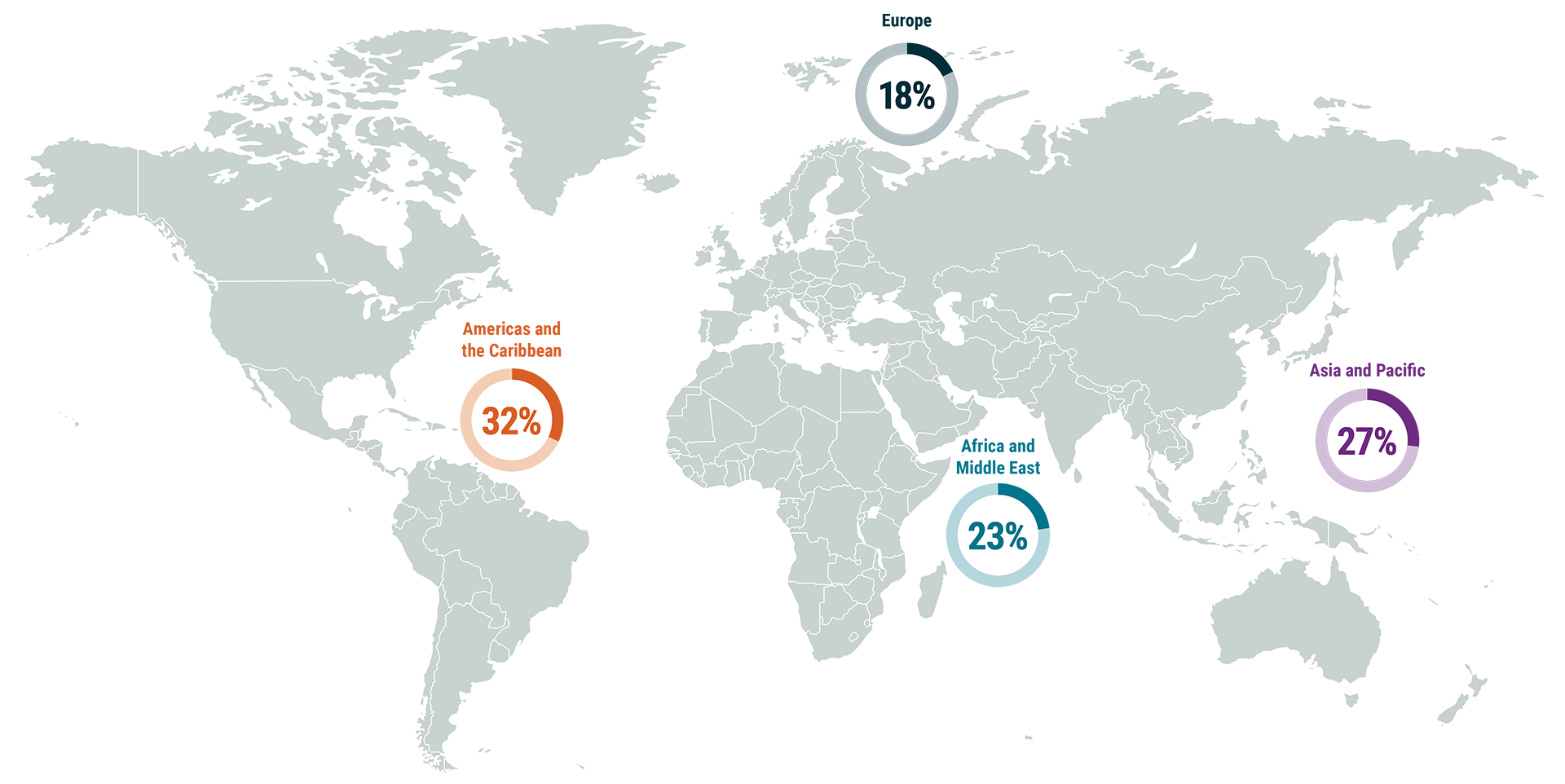
Which Age Groups Are Represented?
Over the past year, the predominant age group of respondents shifted from individuals aged 25 to 35 to those aged 36 to 45, with the latter now comprising the highest number of responses.


Global State of Business Analysis Report: Part 1
This report is the first instalment of a three-part series that explores key areas of the business analysis profession. Part 1 provides a panoramic view of topical information and insights on salaries, high-paying industries, education, and more.
Read on for valuable insights to empower your professional journey.
Education and Employment Trends

When it comes to dominant education level by region, Europe is the exception, with 48% of respondents holding a master's degree. In both the Americas/the Caribbean and Africa/Middle East, 46% have a bachelor's degree, while in Asia/Pacific this figure drops to 42%.
Dominant Education Level by Region
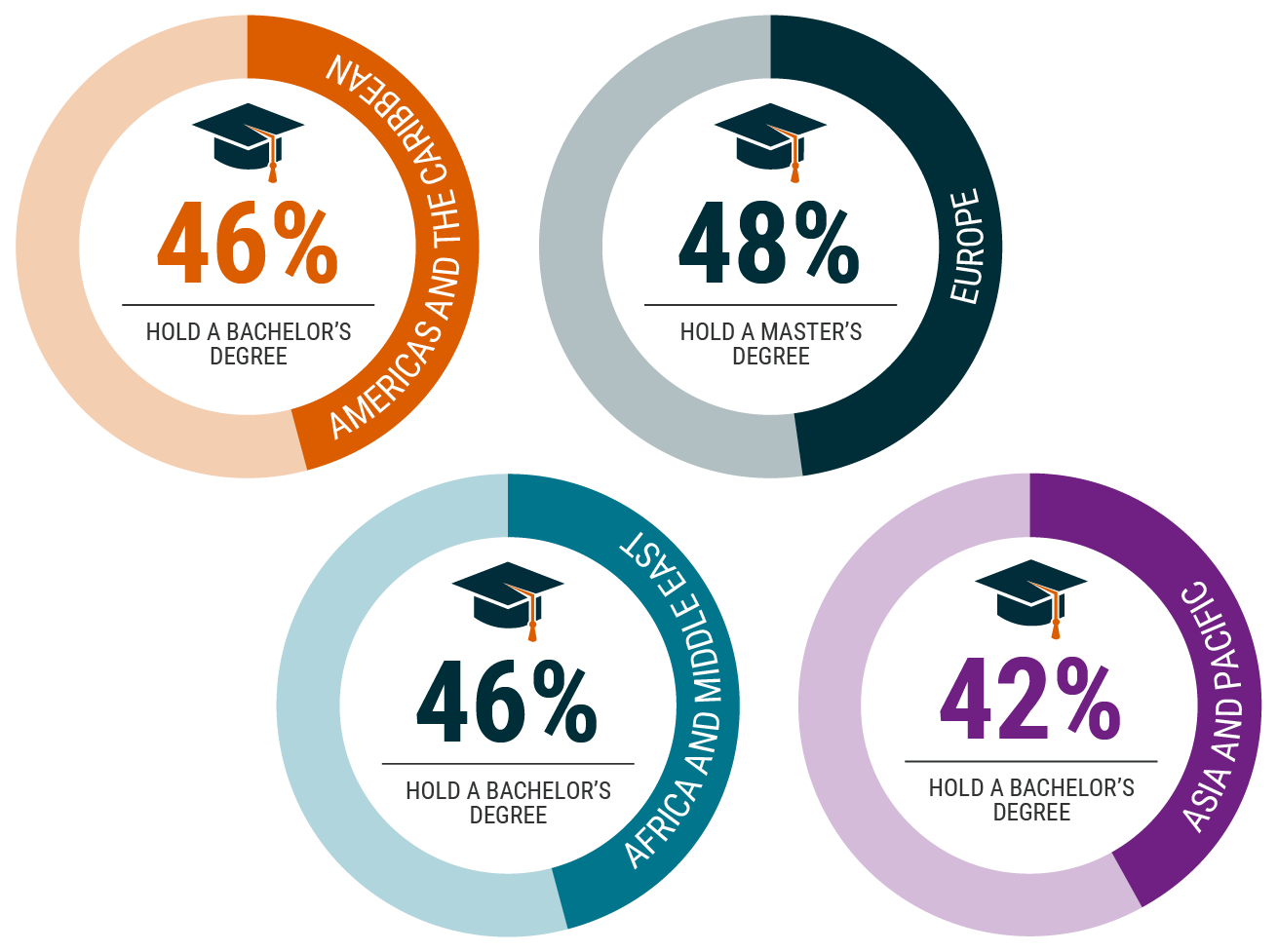

Understanding employment trends is pivotal for strategic and career planning. Among respondents, 77% are employed full time, 6% work as consultants, and 5% are unemployed. Respondents who are self-employed, students, and employed part time account for 4% each.
Employment Status

Unlock Global Salary Insights
Explore how much business analysis professionals earn across career levels, industries, and regions.

Global State of Business Analysis Report: Part 1
This report is the first instalment of a three-part series that explores key areas of the business analysis profession. Part 1 provides a panoramic view of topical information and insights on salaries, high-paying industries, education, and more.
Read on for valuable insights to empower your professional journey.
Part 2: Certification and Career Development
Exploring the factors that influence career satisfaction among business analysis professionals leads to a better understanding of their needs and goals.
This report is the second instalment of a three-part series that explores key areas of the business analysis profession. Part 2 provides a look at certification, career satisfaction, job changes, career fulfillment, agile analysis, product ownership analysis, business data analytics, AI, and more.
Read on for valuable insights to empower your professional journey.
Become a member to access the report
Benefits of Certification
Certification isn’t just about validating your skills—it’s also about enhancing your marketability, employability, and earning potential, leading to on-the-job confidence and greater fulfillment at work.
Would You Recommend Certification to a Colleague to Support Career Development?
An overwhelming 95% of respondents would recommend certification to their colleagues as a means to support career development, a 3% increase compared to the data recorded in both 2021 and 2022.

Certification Distribution Among Respondents
The Certified Business Analysis Professional certification is the most popular, followed by the Entry Certificate in Business Analysis and the Agile Analysis Certification.
What Are the Benefits of Certification?
For the third consecutive year, the top advantage of certification remains heightened workplace confidence. Not only does certification demonstrate competence, but it also fosters self-assurance and resilience. Each year, the correlation between certification and confidence becomes clearer, solidifying the idea that certification drives professional growth and success in the workplace.

When Did You Start Seeing the Benefits of Certification?
Among the individuals surveyed, 83% saw the benefits of certification within the first year, while 32% saw benefits immediately—a 5% rise from the last report. This uptick suggests growing recognition of the value of certification in the workplace.

Salary and Certification
Certified Business Analysis Professional (CBAP)
The CBAP is the premier certification in the field, showcasing the expertise and leadership of seasoned business analysis professionals.
Certification of Capability in Business Analysis (CCBA)
The CCBA is an advanced credential demonstrating effective collaboration, modelling, and opportunity identification skills.
Entry Certificate in Business Analysis (ECBA)
A globally recognized certificate, the ECBA is the first step for aspiring business analysis professionals, validating foundational knowledge and commitment to growth.
Agile Analysis Certification (IIBA-AAC)
The IIBA-AAC meets the rising demand for collaboration between analysts and agile communities, enhancing project delivery.
Certification in Business Data Analytics (IIBA-CBDA)
The IIBA-CBDA highlights proficiency in executing analysis for data analytics initiatives while delivering business value.
Certificate in Product Ownership Analysis (IIBA-CPOA)
The IIBA-CPOA blends business analysis and product ownership with an agile mindset, maximizing product value.
Certificate in Cybersecurity Analysis (IIBA-CCA)
The IIBA-CCA equips professionals with vital cybersecurity analysis knowledge and skills through a robust learning and certification program.

Global State of Business Analysis Report: Part 2
This report is the second instalment of a three-part series that explores key areas of the business analysis profession. Part 2 provides a look at certification, career satisfaction, job changes, career fulfillment, agile analysis, product ownership analysis, business data analytics, AI, and more.
Read on for valuable insights to empower your professional journey.
Career Satisfaction
Does Your Employer Invest in Skills Training?
A significant portion of employees reports that their employers invest in skills training to varying degrees. According to respondents, 76% of employers allocate funds to facilitate ongoing skills enhancement.
How Business Analysis Professionals Develop Their Skill Sets
Respondents are increasingly diversifying their skill development methods. Self-study is the most popular, followed closely by blended learning and online courses. Traditional classroom learning remains relevant at 11%. Both self-study and classroom learning have seen slight increases from the previous report.
Biggest Reason to Change Jobs
The primary reasons respondents consider changing jobs include the pursuit of a higher salary and more interesting work. Other significant factors are the desire for better work-life balance, improved workplace culture, opportunities for promotion, and a greater focus on diversity and inclusion. These motivations highlight the importance of both financial incentives and a fulfilling, supportive work environment in career decisions.


Global State of Business Analysis Report: Part 2
This report is the second instalment of a three-part series that explores key areas of the business analysis profession. Part 2 provides a look at certification, career satisfaction, job changes, career fulfillment, agile analysis, product ownership analysis, business data analytics, AI, and more.
Read on for valuable insights to empower your professional journey.
Part 3: Business Analysis in Organizations
This report is the final instalment of a three-part series delving into the key areas of the business analysis profession. The first provided a panoramic view of topical information and insights that reveal the trajectory of the global business analysis profession. The second explored career development and certification. This instalment focuses on the role of business analysis in organizations along with responsibilities, skills, techniques, and more.
Explore these insights to enhance your professional growth.
Become a member to access the report
Business Maturity
We explore how the role of business analysis has matured, its growing influence on organizational strategies, and its impact on shaping key decisions.
Role of Business Analysis
The top three roles—enabling change by defining needs and recommending solutions (23%), collecting, synthesizing, and analyzing information (20%), and evaluating and improving business processes (19%)—remain largely consistent with last year’s report.
Management of Business Analysis Professionals in Organizations
Business analysis professionals can be managed in four different ways.
Centralized: Part of a unified team under one management group.
Matrixed: Report to both a functional manager and a project/department manager.
Decentralized: Embedded in departments, reporting to local leadership.
No common management: No formal structure.
Skills, Techniques, and Responsibilities
As artificial intelligence (AI) develops, human skills have become essential for business analysis professionals. Skills such as communication, critical thinking, and adaptability empower business analysis professionals to meet business needs and align them with strategic goals.
Core Responsibilities
This year, the role of business analysis has become more granular, with areas such as requirements analysis (9%), elicitation and collaboration (8%), and business analysis planning and monitoring (7%) gaining prominence.
Impact of Artificial Intelligence
With the increasing integration of artificial intelligence in various industries, including business analysis, 63% of respondents anticipate a positive impact on their careers.
Top Skill Development Methods for Teams
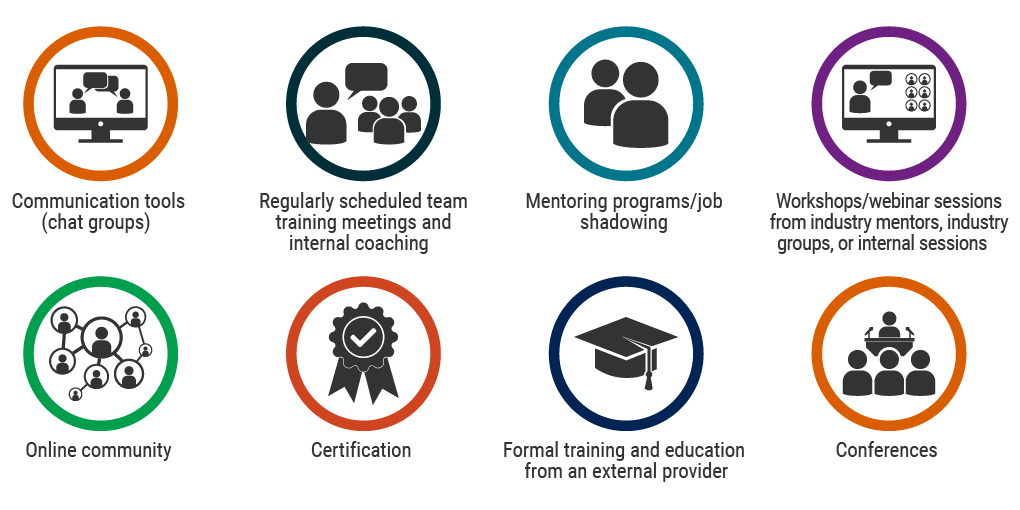
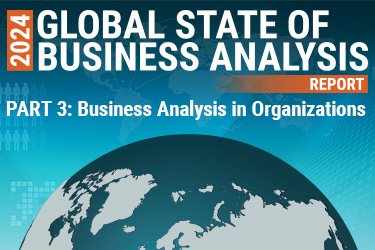
Global State of Business Analysis Report: Part 3
This report is the final instalment of a three-part series delving into the key areas of the business analysis profession. Part 3 focuses on the role of business analysis in organizations along with responsibilities, skills, techniques, and more.
Discover key takeaways to elevate your career.
Explore More Global Research from IIBA
2022 Global State of Business Analysis Report
Career-focused Insights You Need to Know
IIBA’s 2022 Global State of Business Analysis Report (GSBA) provides a view of today’s trends and statistics in business analysis. New this year, Career Journey addresses what professionals need to know about business analysis career phases, with specific insights including salary, organization types, job titles, and more.
Already a Member? Login to access.
Being Nimble: The Scalable Capability for Organizations to Sense and Respond to Change
As part of IIBA’s Global Research, Being Nimble examines the established concept of business agility and identifies ways that organizations can improve their ability to sense and respond to change through the application of business analysis. Over 65% of organizations with high nimble capacity are best in class or exceed their peers in responding to change.
Already a Member? Login to access.

Part A: How Business Data Analytics is Transforming Industry
As part of IIBA’s Global Research, Achieving More with Data analyzes the forces shaping the use of data and analytics at companies and the strategies, including the use of Business Analysis Professionals, for transforming to a data-driven organization.
Not a member? Get the Preview Edition


